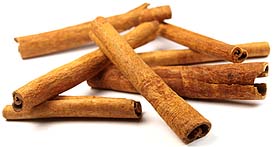| Home A B C D E F G H I J K L M N O P Q R S T U V W X Y Z |
|
Home |
Cinnamon: Natural Treatment for Diabetes
New study confirms that cinnamon's two pronged effects can help to prevent the onset of Type II diabetes Writing in the June 2007 edition of the American Journal of Clinical Nutrition, Swedish researchers have found that cinnamon reduces the sudden rise in blood glucose levels that is one of the underlying causes of Type II diabetes and Metabolic Syndrome. It achieves this by delaying the emptying of the stomach contents into the small intestine. This study provides further scientific evidence that cinnamon can play an important role in preventing the onset of these ubiquitous diseases. 
One of several biochemical mechanisms responsible for the cause of Type II diabetes is insulin resistance. And one of the causes of insulin resistance is the consumption of foods that cause a rapid rise in blood sugar – i.e high glycaemic index (high GI) foods. A diet consisting of predominantly high GI foods leads to sudden, rapid rises in blood sugar levels that over the years may lead to insulin resistance. Insulin resistance is a state where the cell receptors no longer respond adequately to insulin. By failing to respond to insulin the cell is unable to allow glucose through its protective cell membrane and will be deprived of its energy source. This in turn leads to the malfunctioning of intracellular processes and ultimately the diseases, Metabolic Syndrome (Syndrome X) and Type II diabetes. Reducing sudden post-postprandial rises in glucose levels is thus of prime importance if one is to prevent the onset of this group of diseases. One way to achieve this is to eat foods with a low GI rating – there are lists of these foods freely available in books, magazines and on the internet. Another is to eat foods that will reduce the rapid rise in glucose levels associated with the consumption of high GI foods. One of the factors influencing the absorption of glucose is the speed at which the stomach empties. As we know, the stomach has a valve at its junction with the small intestine called the pyloric valve. This valve is usually closed while we eat and will remain so until various nerve and hormonal signals allow it to open. These signals are dependant on several factors including the type of food in the stomach and how relaxed the individual is at the time. Rapid stomach emptying occurs soon after a high GI meal and will cause a rapid rise in blood glucose – not what we want if we are to avoid developing insulin resistance. One way to moderate this process is to eat foods that slow the rate at which food enters the small intestine. A recent study published in the June 2007 edition of the American Journal Of Clinical Nutrition shows that cinnamon is very effective at slowing gastric emptying. Researchers at University of Lund in Sweden used a crossover trial to study the effects of cinnamon on the gastric emptying time and blood glucose levels. They found that volunteers who ate rice pudding with cinnamon had far slower gastric emptying times than those who ate the rice pudding without cinnamon. In addition, those in the cinnamon group did not have the rapid rise in blood glucose levels that those in the plain rice pudding group experienced. Previous studies have shown that cinnamon can increase the sensitivity of insulin receptors directly. This new study shows that it can achieve this indirectly too - that is by delaying gastric emptying thereby minimizing the harmful effect of high GI foods. For centuries cinnamon has been used as a flavourant for confectionaries and it is these foods that are the prime culprits when it comes to metabolic syndrome and Type II diabetes. By adding cinnamon to sweet foods we have been inadvertently reducing the impact that they have on these diseases! However we do need to take greater quantities of cinnamon and other spices if they are to play an effective role in the prevention of these conditions. Cinnamon is one of several valuable spices that can help to prevent and even treat metabolic syndrome and Type II diabetes. Those who do not include enough of these spices in their diets can take a spice supplement that contains all of these important spices. Keith Scott is a medical doctor who has a particular interest in nutrition. He is the author of several books including the best selling Natural Home Pharmacy and more recently the ground breaking, Medicinal Seasonings, The Healing Power of Spices. Find out more about the use of spices in the prevention and treatment of diabetes and other diseases at: medspice.com |
||
|
|
||
|
Glossary References Links Contact
|